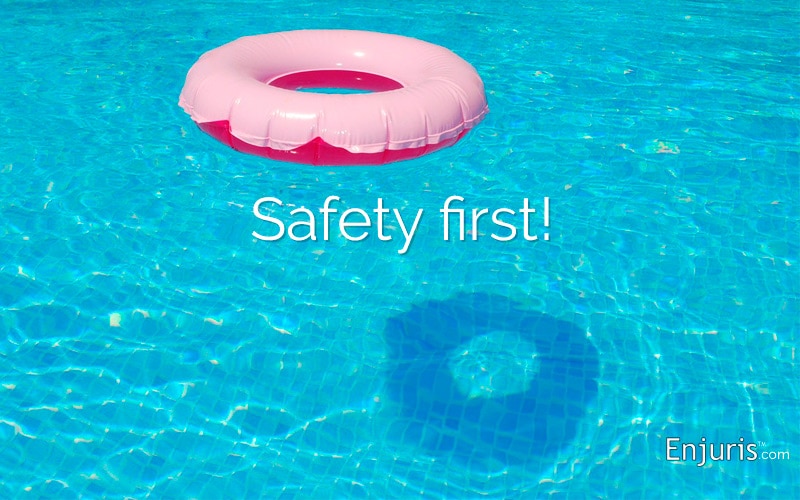
Learn who can be held responsible and how to recover damages
Georgians know that one of the best escapes for a hot summer day is to enjoy time in a swimming pool. Unfortunately, this relaxing summer activity can easily turn deadly. Georgia drowning deaths have continuously increased since 2013, and Georgia ranks as one of the top 5 states for drowning fatalities as recently as 2017.
Accidents from lack of supervision at a pool or improper pool safety are classic negligence cases. This article provides an overview of swimming pool liability in Georgia and offers some important safety tips.
Common injuries from swimming pool accidents
Though drowning is the primary concern when it comes to swimming pool accidents, other accidents may also result in very serious injuries. Near-drowning accidents can result in terrible tragedies such as submersion injuries and oxygen starvation to the brain. Significant oxygen deprivation can result in traumatic brain injuries and brain death.
Drowning-related disabilities are life-changing in multiple ways. Medical costs for patients of this magnitude can hit $180,000 per year. If there is permanent brain damage, the bills can reach $4.5 million over that person's lifespan.
Diving into shallow water can also result in serious harm to the spinal cord or brain. These injuries can cause permanent damage that affects a person's cognitive abilities, language center, motor skills and many other functions. Neurological function will also be impaired, ranging from the ability to breathe, to partial or complete paralysis.
How to pursue a negligence lawsuit from a swimming pool accident
If you or a loved one was injured in a swimming pool accident, a negligence claim is typically possible in order to recover damages. Though a lifeguard may have been at fault, the owner of the pool is typically the main defendant in the case.
A negligence lawsuit in Georgia requires that your attorney prove the following:
1. The pool owner/manager owed you a duty.
This criteria is typically satisfied provided that you were lawfully using the pool and not trespassing.
2. The pool owner/manager breached that duty.
This is satisfied by showing that the owner did something that the average, reasonable person would consider unsafe. Leaving children unsupervised, not marking the shallow side of a pool or not safely locking up a pool are all common examples of negligent acts.
3. The breach of duty caused your accident.
In short, this criteria is satisfied if the pool owner or manager’s actions were the direct cause of the accident. This is the trickiest element to prove as fault also comes into play. If, for example, you were at the pool and weren’t paying attention to your child when an accident occurred, you may be assigned a degree of fault. Because Georgia is a comparative fault state, your actions must less than 50% to blame for the accident for you to recover damages.
4. You sustained injuries as a result of the pool owner/manager’s actions.
This criteria is also met easily as you’re likely suing the pool owner or manager to recover compensation for medical bills, pain and suffering and lost wages.
Georgia’s “attractive nuisance” doctrine
Swimming pools pose an additional liability risk to all pool owners in Georgia. Under Georgia law, swimming pools are considered an “attractive nuisance” to children. Little children, even trespassing children, require protection from accessing and falling into your pool. Thus, a pool owner is likely to be deemed negligent if their pool doesn’t have a locked fence, pool cover or any other means to protect easy access when an accident occurs.
Pool safety tips
In order to still be able to enjoy the pool on a beautiful Georgia day, here are some tips for a safer pool environment:
- Make sure young children and inexperienced swimmers wear flotation devices that fit properly.
- Keep a watchful eye on swimmers by minimizing your distractions.
- Don’t use headphones or read a book when watching children at the pool.
- Put your cell phone away while on duty, but keep it close by in the event of an emergency.
- Stop any horseplay that could result in someone falling into the water or being held under water.
- Don't swim alone; bring a friend with you.
- Don't swim after drinking, smoking or using prescription medication.
- Don’t swim in public pools if there isn’t a lifeguard on duty.
- Keep pool noodles, tubes and other flotation devices in the water in case anyone falls in.
- Learn CPR and lifesaving swimming techniques.
- If you own a pool, make sure that access is restricted by a gate, lock or pool cover.
Additional resources
Below are some important additional pool safety resources to help keep your loved ones safe:
- Association of Pool and Spa Professionals: This organization offers information regarding safety equipment and standards around these common household items.
- Centers for Disease Control and Prevention: This "healthy swimming" page provides the latest educational data, info and statistics for everyone from swimmers to medical professionals.
- Drowning Prevention Foundation: After suffering the worst – one child drowned while the other suffered irreparable brain damage when the babysitter's back was turned – Nadina Riggsbee started the Drowning Prevention Foundation to prevent drowning through public education.
- Foundation for Aquatic Injury Prevention: This non-profit aims to reduce near-drowning injuries, drownings and diving injuries, as well as spread educational awareness.
- National Drowning Prevention Alliance: This organization's purpose is to teach as many people about drowning prevention as possible.
- National Swimming Pool Foundation: The NSPF offers books, courses, programs and conferences all designed to offer the best in swimming education that eliminates injuries and accidents.
- Pool Safely: This is a national government campaign by the US Consumer Product Safety Commission to reduce swimming injuries and childhood deaths.
- World Health Organization: The WHO has provided its latest data regarding drowning, as well as its own set of links.
We hope these resources allow you to own a pool or swim without worry. In the meantime, if you need to speak with an attorney, try the Enjuris Georgia law firm directory.

Enjuris now partners with Pool Safely to help prevent child drownings
Pool Safely is a national public education campaign from the U.S. Consumer Product Safety Commission (CPSC). Learn more about how Enjuris and Pool Safely help make water play and summer fun safer for families!
See our guide Choosing a personal injury attorney.
